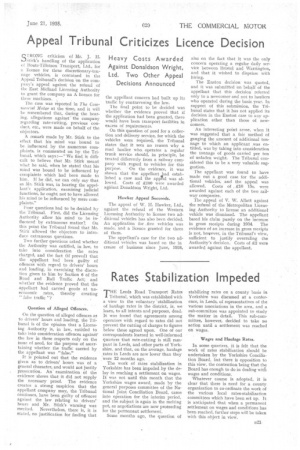Appeal Tribunal Criticizes Licence Decision
Page 35

If you've noticed an error in this article please click here to report it so we can fix it.
STRONG criticism of Mr. J. H. Stirk's handling of the application of Bouts-Tillotson TranSport, Ltd., for a licence for three discretionary-tonnage vehicles, is contained in the Appeal Tribunal's decision on the company's appeal against the refusal of the East Midland Licensing Authority to grant the company an A licence for these machines. „ The case was reported in The C niereM1 Motor at the time, and it will he remembered that, during the hearing, allegations against' the company regarding rate-cutting, previous conduct, etc., were made on behalf of the objectors.
A remark made by Mr. Stirk to the effect that his mind was bound to be influenced by the numerous complaints, is commented on by the Tribunal, which says :—" We find it difficult to believe that Mr. Stirk meant what he said, when he stated that his mind was bound to be influenced by complaints which had been made to him. If he did, we can only say that as Mr. Stirk was, in hearing the appellant's application, exercising judicial functions, he ought not to have allowed his mind to be influenced by mere complaints."
Four questions had to be decided by the Tribunal. First, did the Licensing Authority allow his mind to be influenced by extraneous matter?. On this point the Tribunal found that Mr. Stirk allowed the objectors to introduce extraneous questions.
Two further questions asked whether the Authority was entitled, in law, to take into consideration the rates charged, and the fact (if proved) that the appellant had been guilty of offences With regard to drivers' hours and loading, in exercising the discretion given to him by Section 6 of the Road and Rail Traffic Act; • and whether the evidence proved that the appellant had carried goods at uneconomic rates, thereby creating " false traffic "?
Question of Alleged Offences.
On the question of alleged offences as to drivers' hours and loading, the Tribunal is of the opinion that a Licensing Authority is, in law, entitled to take into consideration offences against' the law in these respects only on the issue of need, for the purpose of ascertaining whether the traffic carried by the appellant was "false."
It is pointed out that the evidence given as to drivers' hours was of a general character, and would not justify prosecution. An' examination of the evidence shows that it did not supply the necessary proof. The evidence creates a strong suspicion that the appellant company may, the Tribunal continues, have been guilty of offences against the law relating to drivers' hours and Mr. Stirk's warning was merited. Nevertheless, there is, it is stated, no justification for finding that the appellant concern had built up its traffic by contravening the law.
The final point to be decided was whether the evidence proved that if the application had been granted, there would have been transport facilities in excess of requirements.
On this question of need for a collection and delivery, service, for which the vehicles were required, the Tribunal states that it sees no reason why a road haulier who, operates a regular trunk service should, in principle, be treated differently from a railway company with regard to vehicles for this purpose. On the evidence, it was shown that the appellant .liad established a case and the appal was allowed. Costs of 2100 were awarded against Donaldson Wright, Ltd.
Hawker Appeal Succeeds.
The appeal of W. H. Hawker, Ltd., against the refusal of the Western Licensing Authority to license two additional vehicles has also been decided. An application for , five vehicles was made, and a licence granted for three of them.
The appellant's case for the two additional vehicles was based on the in crease of business since June, 1034, also on the fact that it was the only concern operating a regular daily service between Bristol and Warrington, and that it wished to dispense with The Enston decision was quoted, and it was submitted on behalf of the appellant that this decision' referred only to a newcomer and not to hauliers who operated during the basic year. In support of this submission, the Tribunal states that it has not applied its decision in the Enstori case to any application other than those of newcomers.
An interesting point arose, when it was suggested that a fair method of gauging the amount of additional tonnage to which an applicant was entitled, was by taking into consideration the tonnage of goods carried per ton of unladen weight. The Tribunal considered this to be a very valuable suggestion.
The appellant was found to have made out a good case for the additional vehicles, _ and the appeal was allowed. Costs of , 210 15s. were awarded against each of the two railway companies.
The appeal of V. W. Allatt against the refusal of the Metropolitan Licensing Authority to license an additional vehicle was dismissed. The appellant based his claim purely on the increase in grosS receipts during 1934. The evidence of an increase in gross receipts is not, however, in the Tribunal's view, sufficient to justify overruling the Authority's decision. Costs of 2.2 were awarded against the appellant.




























































































